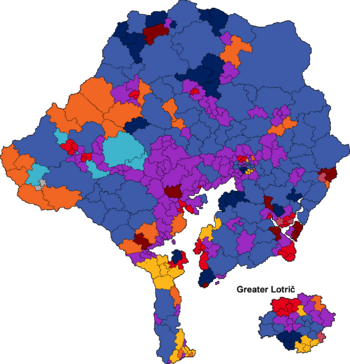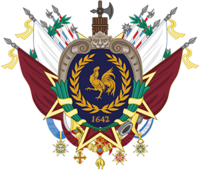Senate of Midrasia
Senate of Midrasia Sénat de Mydrazia | |
|---|---|
 | |
| Type | |
| Type | |
Term limits | None |
| History | |
| Founded | 5 March 1791 |
| Leadership | |
Jacques Magule (LL) since 3 January 2017 | |
Marie-Ange Pelletier (PP) since 3 January 2017 | |
Christian Boissieu (PR) since 3 January 2017 | |
| Structure | |
| Seats | 300 |
 | |
Senate political groups | Reform Bloc |
| Elections | |
| First-past-the-post | |
Senate last election | 14 September 2017 |
Senate next election | 16 September 2021 |
| Meeting place | |
 | |
| Palais del Norte, Parliament Square, Lotrič | |
The Senate of Midrasia (Midrasian: Sénat de Mydrazia) is the upper house of the Parliament of Midrasia, which along with the lower house, the Public Assembly make up the legislature of the Republic of Midrasia. Within the Constitution of 1791 the upper house of the Midrasian Parliament was outlined as an appointed body, with regional authorities sending representatives based on the result of local elections. This has undergone significant transformation in recent years, moving the body away from an entirely appointed body to one composed of directly elected representatives, with all seats being elected every four years.
As the upper house, the Senate has several powers of advice and consent which are unique to it; these include the ratification of treaties, and the appointment of other executive officials and ambassadors. Due to its importance in terms of foreign policy, oversight of the executive and longer term limit, the Senate is widely viewed as the more prestigious of the two houses and is sometimes viewed as the "gateway to the Consulate", with many previous Consuls having served in the body.
As of the 2017 elections the largest party in the Senate is the Progressive Party of the Reform Bloc with 92 seats, with its partner the Liberal League holding role of President of the Senate. The Chartist Bloc is the official opposition and is led by the Republican Party who hold 84 seats.
Membership
Qualifications
According to the Constitution of 1791, following the Nineteenth Amendment, the only qualification to be a member of Parliament is to be a Midrasian citizen who is eligible to vote in elections. Although this originally only allowed property owning males over the age of 21 to become members of Parliament, though following the amendment any Midrasian citizen over the age of 18 to become a member of either the Senate or Public Assembly. Members of the Senate must also hold residence in the region for which they were elected.
Elections and term
Elections to the Senate take place every four years, coinciding with the elections for Consul. Although terms can last up to four years by-elections can be held in cases where a senator resigns, is removed from office or dies. The new election will be scheduled for the earliest possible opportunity, the new Senator takes over the remaining term of the previous Senator. Elections utilise the first-past-the-post system across the nation's 300 senatorial constituencies. Elections for the Senate last for around 4 weeks and usually take place when parliament is adjourned. There are strict spending limits placed on senatorial elections, with each party only able to spend a specified amount each year on national and local advertising. This amount is reviewed every year by the Electoral Commission. Each party is allocated a slot on national broadcasting agencies during an election period to air advertisements, these are usually targeted to individual regions for by-elections and an a national level for elections to the entire Senate.
Salary and benefits
Members of the Senate receive an annual salary of Đ100,000, equal to the salary of a member of the Public Assembly. The President of the Senate receives an additional Đ25,000 on top of their regular Senatorial salary. Each member of the Senate is provided their own office within Parliament. Members of the Senate are also entitled to claim Parliamentary allowances for expenses relating to their official work. This may include, but is not limited to: second homes, travel expenses and Office costs. All expenses are recorded in the Parliamentary 'red books' and are reviewed and published following each Parliamentary term.
Expulsion and other disciplinary actions
The Midrasian Constitution does not give any references to a procedure for the removal of a member of Parliament, however statute law does enable the creation of Investigatory Committees, whether in Parliament on the Midrasian Police Forces, to review the activities of sitting members. Whilst there is no official procedure to remove a member of the Senate, constituents can force a bi-election in the event that 10% of a Senators constituents sign a petition calling for the removal of a specific member.
Officers
President of the Senate
The President of the Senate is the leader of the Senate and is responsible for organising the business of the upper house, overseeing debates and generally ensuring the business of the house is conducted in an orderly manner. The President of the Senate may also cast the deciding vote in the event of a tie within the house. The President of the Senate is a partisan role and is also the Vice-Consul of Midrasia. As of 3 January 2017, the current President of the Senate is Jacques Magule of the Liberal League, representing the Reform Bloc.
Majority and Minority Leader
| Majority Leader Marie-Ange Pelletier |
Minority Leader Christian Boissieu |
Both the Chartist and Reform Bloc elect a chief spokesperson within the Senate. The Majority Leader is responsible for controlling the agenda of the chamber by scheduling debates and votes. The Minority leader effectively mirrors the Majority leader, acting as the primary representative for the opposition bloc. Each bloc also appoints an assistant leader, known as a whip who ensures that each senator votes as their respective party dedicates. The foremost whip of each bloc is referred to as the Chief Whip and is responsible for overseeing their deputies. Party voting allegiance however is usually less formal than within the Newreyan system, with Senators generally voting more based on their own personal conscience than party lines.
Party leaders
Each political party represented within the Senate also appoints an informal leader who acts as the chief spokesperson and primary representative of their respective party within the upper house. This role generally acts as a lesser version of the Majority and Minority leaders. Nevertheless, the party leaders still have a preferential speaking role, they are not as prominent as the two bloc leaders. Each party leader generally co-ordinates with their respective minority or majority leader regarding legislative activity.
Non-voting officers
The Senate also contains two non-voting officers who whilst able to participate in Senate debates and weigh in on issues are unable to participate in Senate votes. These officials include the Representative of the Overseas territories, who is a representative for Midrasia's various holdings outside of metropolitan Midrasia; and the Representative of the Alydian Church who represents the Alydian Church in its official capacity during Senate debates and discussions. These officials have caused considerable controversy in the past with many calling for the Overseas Representative to be granted voting power within the House, whilst many who support the passing of a secularisation bill calling for the abolition of the position of church representative.
Other important officials within the Senate include the Under Clerk of the Parliament who, similar to the Clerk of the Public Assembly, is the Chief Constitutional adviser to the Senate and is responsible for recording the minutes of Senatorial debates and the outcome of decisions and votes made by the upper house. The clerk sits at the Table of the House, in front of the President of the Senate for every Parliamentary session. Traditionally the clerk of the Senate would wear official dress, including a 'bob' wig and gown. This tradition has declined in recent years however, with office holders no longer required to adhere to official dress, save for formal occasions such as the State opening of Parliament.
Procedure
Daily sessions
Much of the procedure of the Midrasian Senate is based in one form or another on the Atrescan system, utilising Standing rules which are voted on at the beginning of a new parliament. The Dais of the chamber is utilised by the presiding officer and other officials such as the Senatorial clerk. Sessions of the Senate are officially opened by the presiding officer and typically convene on weekdays. Sessions of the Senate are typically open to the public for viewing in the galleries and are broadcast live on RAP2.
Procedure in the Senate is also dependent upon a number of customs and traditions. Some of the more stricter rules outlined may be waved through unanimous consent, which are usually negotiated beforehand by each political bloc. Such agreements may be blocked by a Senator, though such objections are a rarity. A "hold" is placed when the leader's office is notified that a senator intends to object to a request for unanimous consent from the Senate to consider or pass a measure. A hold may be placed for any reason and can be lifted by a senator at any time. A senator may place a hold simply to review a bill, to negotiate changes to the bill, or to kill the bill. A bill can be held for as long as the senator who objects to the bill wishes to block its consideration. A hold can withdrawn at any time by the senator who implemented it and can be overcome through an act of cloture, requiring a three-fifths majority. The presiding officer of the Senate is endowed with the powers to enforce the rules of the Senate, warning members who deviate from them and may use the gavel to maintain order.
The Constitution mandates that a quorum is required for the Senate to conduct business. Similar to the Aquidish system, a quorum is always assumed present unless a quorum call explicitly demonstrates otherwise. Senators may request a quorum call by suggesting "the absence of a quorum", requiring the clerk to call a role of the Senate and indicate which members are absent. In reality, such proceedings are usually only used as a delaying tactic, giving time for members to arrive at the Senate, or for leaders to negotiate. Once the need for a delay has ended, a senator may request unanimous consent to rescind the quorum call.
Debate
Debate within the Senate chamber is also governed by the standing rules. During debate, senators may only speak if called upon by the presiding officer, but the presiding officer is required to recognise the first senator who rises to speak. Thus, the presiding officer has little control over the course of debate. Customarily, the Majority Leader and Minority Leader are accorded priority during debates even if another senator rises first. All speeches must be addressed to the presiding officer, who is addressed as "Monsieur President" or "Madame President", and not to another member; other Members must be referred to in the third person. In most cases, senators do not refer to each other by name, but by state or position, using forms such as "the senator for Oyonaix", "the member for Port d'Argois", or "my distinguished friend the Chairman of the Judicial Committee". The rules of the Senate provide that no senator may make more than two speeches on a motion or bill on the same legislative day. A legislative day begins when the Senate convenes and ends with adjournment; hence, it does not necessarily coincide with the calendar day. The length of these speeches is not limited by the rules; thus, in most cases, senators may speak for as long as they please. Often, the Senate adopts unanimous consent agreements imposing time limits.
A filibuster is sometimes used as a tactic by individual senators or parties as a whole in order to defeat a bill or motion by prolonging debate beyond the allocated sitting time of the Senate. In order for a filibuster to be bypassed, the Senate must pass and act of cloture, requiring a three-fifths majority. Unlike some democracies however, the standing rules of the Senate mandate that a filibuster cannot simply be threatened, and must be carried out in its full capacity by a sitting senator. Furthermore, the standing rules also require that all debate within the Senate cover only points germane to the topic under consideration or the debate underway whilst speaking. As a result, filibusters are generally a rare occurrence, though in recent years their frequency has increased somewhat.
The Senate may also enter a closed session, during which times the galleries are closed and cameras turned off, and anyone not sworn to secrecy and not required to be in the chamber are removed. A record of what is said is kept by the Clerk of the Senate however it requires a majority vote from the Senate to release the transcript. Closed sessions are only engaged during sensitive briefings or impeachment trials. Committee sessions are required to be public and open and require a majority vote of the committee members to be closed.
Voting
Under the Constitution, the Senate has nearly the same powers as the Public Assembly. Bills may be submitted by either house of Parliament, though all financial legislation must be submitted within the Public Assembly. Because both houses may amend the bill, it may take several readings to reach an agreement between the Public Assembly and the Senate. When debate concludes on a bill or motion for consideration, the presiding officer may call for a vote. The Senate first votes via a voice vote, with members responding either "Si!" (in favour of the motion), or "Non!" (against the motion). The clerk of the Senate then announces the result of the voice vote, but if his or her assessment is challenged by any member or the voice vote is unclear, a recorded vote known as a division follows. The presiding officer, if he or she believes that the result of the voice vote is clear, may reject the challenge. When a division occurs, members enter one of two lobbies (the "Si" lobby or the "Non" lobby) on either side of the Chamber, where their names are recorded by clerks. A member who wishes to pointedly abstain from a vote may do so by entering both lobbies, casting one vote for and one against. At each lobby are two tellers (themselves members of the House) who count the votes of the members.
Once the division concludes, the tellers provide the results to the presiding officer, who then announces them to the House. If there is an equality of votes, the President of the Senate has a casting vote. Ties very rarely occur, with the last taking place in 2005. The quorum of the Senate is 40 members for any vote. If fewer than 40 members have participated, the division is invalid.
Committees
The Senate uses committees, and their respective subcommittees for a variety of purposes, such as the review of bills, or oversight of the executive branch. Standing Committees are permanent committees, though the Senate may also vote to establish new committees, known as Select Committees, for expressed purposes up-to a total of 8. Each committee is made up of 15 senators based on each parties representation within the Senate. Officially the whole house votes on appointees, though in realities appointees are selected by the individual parties. Expertise and seniority are usually used to determine the make-up of committees. Once the membership of the committee has been decided the members vote on a chairperson to preside over meetings, usually the majority bloc takes the chairman role.
Whilst the Public Assembly is also able to establish its own independent committees, the Senate is regarded as the most prestigious of the two houses of parliament and as such Senate committees are regarded as the de facto primary authority on committee matters. Furthermore, the Senate is the only house able to establish committees to investigate the activities of the executive, and the only house capable of carrying out an impeachment trial.
Current composition and election results
Current party standings
- Further information: List of political parties in Midrasia
| |||||||||||||||||||||||||||||||||||||||





